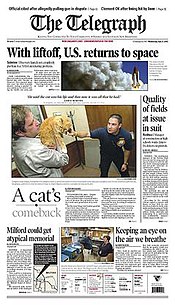This is an old revision of this page, as edited by Professor2789 (talk | contribs) at 10:16, 18 December 2018 (→1980 presidential primary debate). The present address (URL) is a permanent link to this revision, which may differ significantly from the current revision.
Revision as of 10:16, 18 December 2018 by Professor2789 (talk | contribs) (→1980 presidential primary debate)(diff) ← Previous revision | Latest revision (diff) | Newer revision → (diff) The July 27, 2005 front page of The July 27, 2005 front page ofThe Telegraph | |
| Type | Daily newspaper |
|---|---|
| Format | Broadsheet |
| Owner(s) | Ogden Newspapers |
| Publisher | Heather Goodwin Henline |
| Editor | Matthew A. Burdette |
| Founded | October 20, 1832 (1832-10-20), as New-Hampshire Telegraph |
| Headquarters | 110 Main St., Suite 1, Nashua, New Hampshire 03060, United States |
| Circulation | 16,653 daily 22,169 Sundays in 2012 |
| OCLC number | 22532489 |
| Website | www |
The Telegraph, for most of its existence known as the Nashua Telegraph, is a daily newspaper in Nashua, New Hampshire. It was founded as the Nashua Daily Telegraph in 1869, although a weekly version dates back to 1832. As of 2005 it was the second-largest newspaper in the state, with a circulation of about 27,000 daily, and 34,000 on Sunday.
After being family-owned for a century, The Telegraph was bought in the 1980s by Independent Publications of Bryn Mawr, Pennsylvania, which owned several smaller daily and weekly newspapers around the United States as well as some other businesses. In 2005, the paper's owner bought the Cabinet Press, publisher of weekly newspapers based in nearby Milford, New Hampshire. In April 2013, it was bought by Ogden Newspapers of Wheeling, West Virginia.
1980 presidential primary debate
The paper received national attention during the 1980 New Hampshire presidential primary, when it hosted a Republican debate paid for by the campaign of former California Governor Ronald Reagan. During a discussion over which candidates should be allowed to participate, Telegraph editor Jon Breen, acting as moderator, ordered sound man Bob Molloy to shut off Reagan's microphone, which Molloy refused to do, and which was also met with shouts of protest from the audience. Although he mispronounced Breen's name, Reagan's response of "I am paying for this microphone, Mr. Green!" was wildly cheered by the audience and even applauded by his fellow opponents. The phrase entered the political lexicon and the publicity helped to boost Reagan's successful run for the presidency.
Reagan later recounted the incident as a "brief and seemingly small event, one lasting only a few seconds", that he said he thought, "helped take me to the White House". He continues:
When the Nashua Telegraph offered to sponsor a debate between the two of us on the Saturday evening preceding the election, we both accepted. Understandably, this brought howls from the other candidates. In protest, one of them, Senator Bob Dole, complained to the Federal Election Commission that by financing a debate between only two of the seven candidates, the newspaper was making an illegal contribution to the Bush and Reagan campaigns. The commission agreed with him, so my campaign offered to pay the full cost of the debate—a few thousand dollars—and they accepted. I thought it had been unfair to exclude the other candidates from the debate.
After arriving at the debate, he found two chairs, one each for Bush and Reagan. The other candidates were confused, as was the audience.
I decided I should explain to the crowd what the delay was all about and started to speak. As I did, an editor of the Nashua newspaper shouted to the sound man, "Turn Mr. Reagan's microphone off." Well, I didn't like that—we were paying the freight for the debate and he was acting as if his newspaper was still sponsoring it. I turned to him, with the microphone still on, and said the first thing that came to my mind: "I am paying for this microphone, Mr. Green!" Well, for some reason my words hit the audience, whose emotions were already worked up, like a sledgehammer. The crowd roared and just went wild. I may have won the debate, the primary—and the nomination—right there.
See also
- Concord Monitor
- Foster's Daily Democrat
- New Hampshire Union Leader
- The Keene Sentinel
- The Portsmouth Herald
- Republican Party presidential primaries, 1980
References
- "FAS-FAX Report: Circulation Averages for the Six Months Ended March 31, 2012". Audit Bureau of Circulations. Retrieved May 21, 2012.
- http://www.nashuatelegraph.com/apps/pbcs.dll/article?AID=/20040917/IPI/40917071
- http://cabinet.com/apps/pbcs.dll/article?AID=/99999999/ABOUT/60915001/-1/about Archived 2007-07-15 at the Wayback Machine
- Berry, Jake (21 April 2013). "New publisher on job with Telegraph". The Telegraph.
- "The Telegraph Editorial: End of an era, start of new one". The Telegraph. 21 April 2013.
- "Interview with sound man Bob Molloy over his refusal to shut off Reagan's microphone". YouTube. 2015-08-28. Retrieved 2018-12-17.
- "YouTube of Reagan "I am paying for this microphone" comment". YouTube. 2008-02-22. Retrieved 2013-11-19.
- Dunham, Richard (20 October 2009). "New book tells inside story of pivotal Bush-Reagan debate in Nashua". The Houston Chronicle.